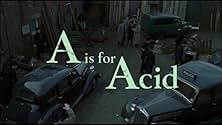John George Haigh, the notorious "acid bath murderer" in 1940s England, becomes the subject of this dramatization.John George Haigh, the notorious "acid bath murderer" in 1940s England, becomes the subject of this dramatization.John George Haigh, the notorious "acid bath murderer" in 1940s England, becomes the subject of this dramatization.
Christopher Ettridge
- Steven Rogers
- (as Chris Ettridge)
- Director
- Writer
- All cast & crew
- Production, box office & more at IMDbPro
Featured review
I saw this TV-made film for the first time last night. I know "sociopath" and "psychopath" are labels and that everyone is an individual and no label, even attached to a mass-murderer such as Haigh could really explain his actions which can only be described as destructive and evil. Martin Clunes was clearly relishing the role and I have to say, I found him completely convincing in it. Whilst the adaptation does suggest the strict religious sect his parents adhered to was a strong influence in his development into a psychopathic murderer, I think this film interpretation of his character indicated he had a sense of entitlement to taking what he wanted in life and he had no boundaries, no conscience, saw no reason why he could not do what he wanted to do to get it all. He would appear to be one of those people who believes their own lies to the extent they can successfully convince many others. I think the reason he committed the murders was because he could and he seems to have committed them for personal gain. He had none of the normal moral and ethical boundaries in place to prevent him. He was unable to understand or foresee the consequences of his actions. Since the explanation he was influenced by his religious background came from Haigh himself, who was a practised and pathological liar, I leave it to the experts to determine whether such people as Haigh are the products of nature or nurture or a tragic combination of many contributing influences.
- barbara-364
- Apr 11, 2015
- Permalink
Storyline
Did you know
- GoofsIn 1945, the widow Olive Durand-Deacon describes her husband as having served in "The Glorious Glosters". Although a common nickname for the Gloucestershire Regiment, it derives from their heroism at the battle of the Imjin River during the Korean War - in 1951.
- Quotes
[for the third time, Haigh is in prison for fraud]
John George Haigh: Do you realise, without a body, there can be no conviction for murder?
Morrison: Blimey. Gerra way.
John George Haigh: It's true. The law is called "corpus delicti".
Morrison: So who are you gonna murder, then?
John George Haigh: Well, if you get 21 months for doing very little, might as well do something big.
- ConnectionsFeatures Nosferatu le vampire (1922)
- SoundtracksWhen the Lights Go On Again
(uncredited)
Performed by Vera Lynn
[detectives inspecting the first crime scene]
Details
- Release date
- Country of origin
- Language
- Also known as
- Crimes Quase Perfeitos
- Filming locations
- Bradford Industrial Museum, Moorside Mills, Moorside Road, Eccleshill, Bradford, West Yorkshire, England, UK(Haigh's parents' house and neighbourhood)
- Production companies
- See more company credits at IMDbPro
Contribute to this page
Suggest an edit or add missing content
























